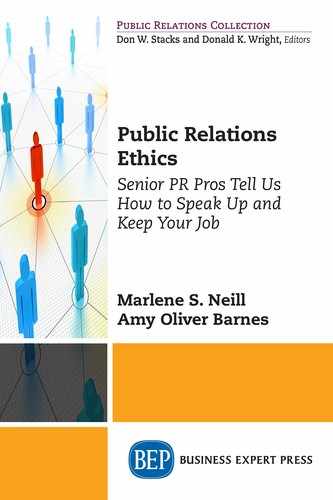Since advice based on experience is often the most valuable advice, for this book we sought insights from senior public relations executives about successfully raising ethical concerns to senior leaders. While our focus is ethics counsel, some of the lessons learned can be applied to public relations counsel generally. Additionally, these senior public relations leaders provide guidance for gaining influence in a company or organization, which is essential for any effective public relations strategy. These insights are based on nearly 150 interviews and survey research conducted over several years. This project began as a follow-up to 2012 published research conducted by Neill and Drumwright, which involved in-depth interviews with 30 public relations executives. Occasionally, we include some quotes from that study as well, some of which have never been previously published.
We also include findings from a second study, which was conducted in 2012 by Neill and involved 30 in-depth interviews with senior executives working in four different U.S. companies. That study provides additional insights for navigating internal politics (see Chapter 5). A third study, published in 2016 by Neill, was based on in-depth interviews with 32 professionals specializing in internal communication to discover recommendations for building an ethical culture (see Chapter 8).
Finally, in preparation for this book, we gathered new data—including 34 in-depth interviews with members of the PRSA College of Fellows and 21 current and former members of the Arthur W. Page Society, representing more than 40 hours of new insights. The PRSA College of Fellows is an exclusive group of approximately 350 senior professionals, each with a minimum of 20 years of experience in public relations, accreditation (APR), and recognition for distinguished careers in public relations. The PRSA Fellows interviewed had an average of 35 years of experience in public relations. The Page Society is an elite group as well, open by invitation only to chief communications officers (CCOs) of Fortune 500 corporations and leading nonprofit organizations, the CEOs of public relations agencies, and senior professors from business and communications schools. The current and former Page Society members interviewed had an average 30 years of experience in public relations. Due to the sensitive and confidential nature of the issues discussed, we agreed not to name the participants, so they will only be identified as a PRSA Fellow or Page Society member and by gender, when appropriate. We also conducted survey research with PRSA Fellows and members of the Southern Public Relations Federation (SPRF), with a sample of 72 participants (33 PRSA Fellows and 39 SPRF).
